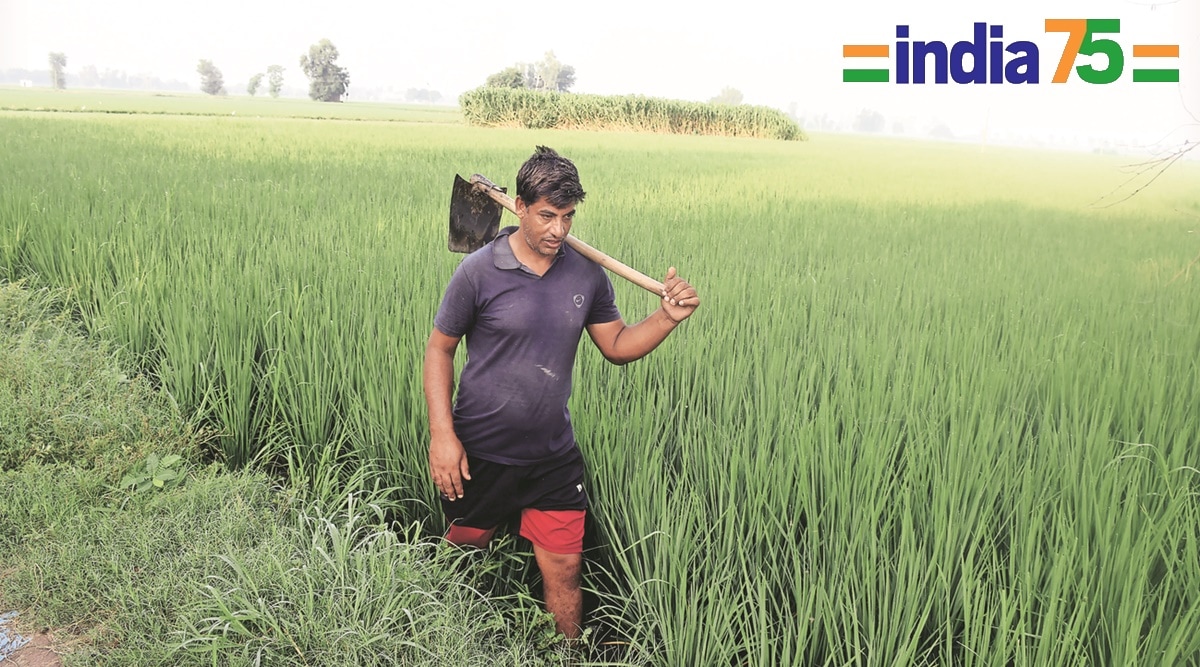 Shafiq Ahmad’s sisters are in Lahore. (Express Photo: Rana Simranjit Singh)
Shafiq Ahmad’s sisters are in Lahore. (Express Photo: Rana Simranjit Singh) Everyone in Jhabal Pukhta knows “Fiqe’s house” — “Drive down till the hospital and take the lane adjoining the fields. You will get there”.
Fiqe is Shafiq Ahmad, whose family is the only Muslim one now in this village of 3,000, most of them Jat Sikhs, located just 15 km from the India-Pakistan border at Wagah. In the Partition wave of 1947, among those who crossed over to Pakistan were families from Jhabal Pukhta, including several relatives of Ahmad.
His grandfather left, while his grandmother stayed behind, along with Ahmad’s father Rafiq, who was born in Jhabal Pukhta. Rafiq got married here and had three children, Ahmad plus two daughters. The daughters are now married to first cousins living in Lahore; while Ahmad got married to Mafia there almost a decade ago, and got her to Jhabal Pukhta.
Among the tales of Partition horrors and divided families, his is that happy story: of a border that has not come in the way. Whenever there is an important occasion in the family — be it this side or that — they make sure to get their travel permits to participate together. By road, Jhabal Pukhta is an hour’s drive from Lahore.
Sarpanch Balbir Singh Pattu says, “No special event in the village is complete without the presence of Shafiq and his family, weddings or festivals. His family from Pakistan, especially his two sisters, visit every other year. Last year, the chhota parauna (his younger brother-in-law) came from Lahore and spent a month with them.”
Pattu’s own grandmother migrated to Jhabal Pukhta from Lahore. She is no more, but he vividly remembers her stories of the city and her neighbourhood.
Ahmad says they have personally not faced much problem, on either side, getting permits and short-term visas for family functions — except for times of high tension at the border, including the India-Pak wars of 1965 and 1971. He last travelled to Lahore for a family wedding several years ago. The sisters visited more regularly, though travel has come to a halt since the pandemic started.
Tarn Tarn district has the largest number of border villages along the 553-km Radcliffe Line, followed by Amritsar and Gurdaspur.
Many villages, located closer to the border than Jhabal Pukhta, have heavy security presence. Pul Kanjari, the last hamlet on the Indian side, looks more of a security outpost. A majority of the agricultural holdings too are situated in No Man’s Land, beyond the barbed-wire fence erected in the 1980s to keep a check on infiltration.
Villagers say they are used to hurried evacuation every time tension between India and Pakistan rises. With little to hold them back, the youth look for the earliest way out — most of them to the greener pastures of Canada, after selling their land. Drug use is known to be common. Says a senior BSF official posted at Wagah checkpoint, “Drugs have been rampant among youngsters in border villages for a decade now, mostly smuggled through the border fencing.”
This is not the case in Jhabal Pukhta, Pattu says with pride, adding that only around eight people from the village have migrated to Canada. “Most of the villagers here are self-employed and self-sufficient — either as shopkeepers or as farmers. Politics or Pakistan, we remain unaffected.” The village has several schools, both government and private, and decent roads.
The one thing lacking is good healthcare. “The government hospital has no facilities even for regular diagnostics, nor are there enough doctors. It’s God’s mercy and our strict control on movement that the village remained unaffected by Covid-19, else it would have been a disaster,” says Pattu.
One of the schools in Jhabal Pukhta dates back to the 19th century, built under the British. Pattu says it has seen extensive facelift during his 19-year tenure as sarpanch.
Ahmad and Mafia live with their two daughters, a toddler son and their cattle in a house in the middle of the fields. The daughters attend Sri Guru Harkishan Public School in Chabal, 2 km away, and Ahmad drops them on his motorbike. It is the best private school in the vicinity, he says.
Ahmad’s father Rafiq, the one who didn’t go to Pakistan, continues to live in their ancestral house, located in the residential area of the village.
Giving chilled sharbat to her daughters who have just returned from school, Mafia says, “This is our village and this is our life.”
- The Indian Express website has been rated GREEN for its credibility and trustworthiness by Newsguard, a global service that rates news sources for their journalistic standards.

